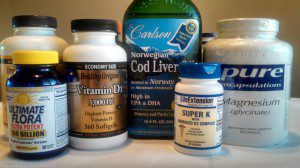 Nutrient density, meaning the actual vitamins, minerals and other essential nutrients contained in food, is different than it was 40,000 years ago when we were hunter gatherers.
Nutrient density, meaning the actual vitamins, minerals and other essential nutrients contained in food, is different than it was 40,000 years ago when we were hunter gatherers.
Here is a list of supplements our modern body needs to best replicate the nutritionally dense diet our ancestors ate.
Essential Fatty Acids/Omega-3
While the body can synthesize many types of fats, it is unable to produce linoleic or alpha linolenic polyunsaturated fatty acids.
Linoleic acid is from the pro-inflammatory omega-6 family and can be found in grains, vegetable oils, nuts and seeds. Since the modern day omega-6 to omega-3 essential fatty acid ratio is high, there is no need to supplement with omega-6; sufficient amounts can be obtained through diet.
Alpha linolenic acid is a member of the anti-inflammatory omega-3 family and can be found in cold water fish, wild game, grass-fed meats, omega-3 enriched eggs, walnuts and dark leafy greens.
Click here for a supplemental source of Omega-3.
Vitamin D3
Known as the sunshine supplement because the body manufactures it after exposure to sunshine, Vitamin D helps the brain produce seratonin. It may also prevent seasonal depression.
The latest research shows that vitamin D3 deficiency is linked to many health conditions such as back pain, cancer, insulin resistance, pre-eclampsia during pregnancy, impaired immunity and macular degeneration, among others.
Ancestral humans consumed an abundance of vitamin D foods, including intestines, organ meats, and the skin of animals they caught, as well as fatty fish and insects. But in our modern diet, we tend to avoid foods that are rich in vitamin D, such as kippers, sardines, mackerel, herring, and egg yolks.
Click here for a supplemental source of Vitamin D3
Probiotics
Probiotics are beneficial microorganisms that are the same as or similar to the bacteria we already have in our bodies. We consume them through fermented foods or supplements because they promote a healthy balance of gut bacteria (symbiosis).
Studies have shown that an imbalance of bacteria in your digestive system (dysbiosis) is associated with disease. However, the consumption of probiotics can correct dysbiosis and has been linked to a wide range of health benefits.
Click here for a supplemental source of Probiotics
CoenzymeQ10 (Ubiquinol is the biologically active form)
CoenzymeQ10 is a coenzyme, meaning that it helps enzymes, acting as a catalyst for biological chemical reactions. It is involved in basic energy production for every cell in the body.
CoenzymeQ10 is also a potent, fat-soluble antioxidant. It can help with cardiovascular conditions, cancer, immune disorders, and periodontal disease. It can also boost energy and speed recovery from exercise.
Dietary sources include organ meats such as heart, liver and kidney, as well as sardines and mackerel.
Click here for a supplemental source of CoenzymeQ10
Magnesium
Magnesium is one of the most important minerals in the body; it is used in over 350 enzyme processes. Every cell in your body has magnesium in it, yet it is one of the most overlooked and depleted minerals in the modern diet.
Some of the illnesses associated with magnesium deficiency include asthma, constipation, muscle cramps, PMS, fibromyalgia, depression, hypoglycemia, insulin resistance, kidney stones, chronic fatigue syndrome, anxiety, depression, migraine headaches, hypertension, and heart disease.
Good dietary sources of magnesium include dark green leafy vegetables such as Swiss chard and spinach. Magnesium is also found in nuts and seeds, such as almonds, Brazil nuts, hazelnuts, pumpkin seeds, sesame seeds, and sunflower seeds.
Click here for a supplemental source of Magnesium
Multi Nutrient Formula
For general health purposes a daily multivitamin is like a little added insurance. Unfortunately, some of our foods are produced from depleted soils, so even if you eat high-quality foods, you may not be getting an abundance of healthy nutrients.
Click here for a supplemental multi-vitamin and mineral
Glucosamine
Glucosamine may be beneficial for those suffering from joint problems. Research suggests that supplemental glucosamine stimulates the production of cartilage-building proteins and inhibits the production of cartilage destroying enzymes. It also reduces the symproms of joint dysfunction-the pain, swelling and tenderness-and improves overall mobility.

